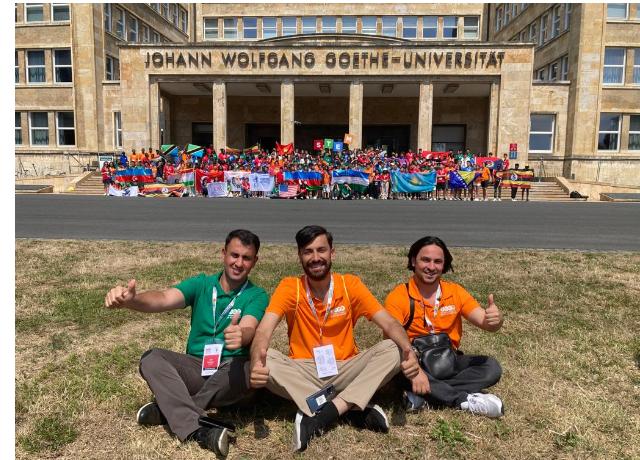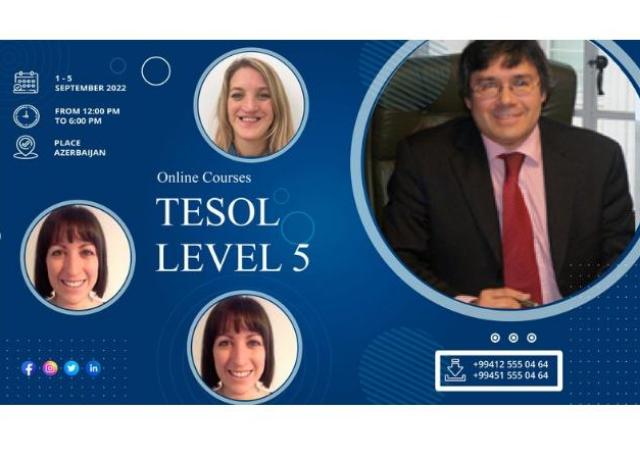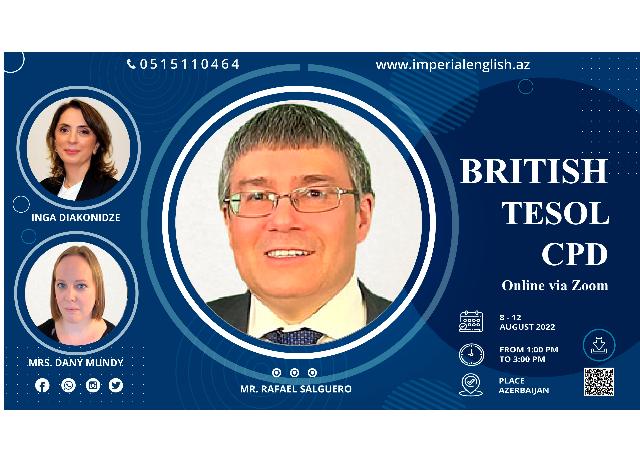BRITISH TESOL CERTIFICATE TRAINING
Bu xəbəri paylaş
BRITISH TESOL CERTIFICATE TRAINING
On June 2, Imperial English Azerbaijan (IEAZ) concluded the “BRITISH TESOL CERTIFICATE TRAINING” specially developed in terms of the application of new innovative methodologies, approaches, pedagogy and assessments in teaching of the English language to further develop the teaching skills of English teachers.
The first 40 hours of the 50-hour general training period, which includes theory and basic knowledge, new teaching skills and ideas, video, PowerPoint presentations, research articles and training notes, practical teaching materials, valuable experience exchanges with master teachers, online workshops, are relf-study, and 10 hours are online seminars. The workshops were conducted by Mr. Rafael Salquero, Deputy Principal of Birmingham College, Head of Education Department of Imperial English UK, Dani Mandi, International Trainer from the UK, and Inga Diakonidze, Professor at Kutaisi International University, Georgia.
Before the training, an online meeting was organized between Imperial English United Kingdom (IEUK) officials and the applicants-teachers, the training staff got acquainted with the participants, and the participants, in turn, asked various questions to the organizers.
The first workshop covered curriculum, classroom management, topics such as assessment procedures and grammar teaching based on 21st century modern teaching methods. First of all, the trainers shared their opinions based on their experiences, emphasizing that lesson planning is desirable for every teacher, and that the teachers' lesson plan makes the course and time distribution more productive. Then, the participants shared their thoughts, noting that the planned organizaion of the lesson process has a further impact on the systematic formation of students' knowledge received from teachers.
.jpg)
The second workshop of the training was more interesting. Thus, the trainers shared different opinions and examples, noting that 4 content lines - reading, writing, listening and speaking skills - predominate in the study of foreign languages and they are closely related to each other. Participants, in turn, stressed that students must be able to pronounce words correctly when speaking, understand correctly when listening to others, and even spell words they are unfamiliar with when writing, and that teachers need to develop these four content lines simultaneously in order to instill them in students.
(1).jpg)
In the third workshop, which focused on teaching English at an academic level based mostly on methodological approaches, also information research and the teaching process in large audiences was discussed, and the possibility of using certain methods based on trainers' experiences to develop academic English in students was brought to attention.
.jpg)
The fourth workshop on new innovative methodologies focused on language skills - students' ability to use keywords, create new words using keywords, develop reading skills by adding one word or phrase to another word, create new phraseological combinations using word combinations, and it was noted that all the abovelisted bring innovation to the language. In general, it is emphasized that language skills improve skills, such as reading in the classroom, also acquiring the ability to observe, write, and ask thought-provoking questions, and that especially students need to pronounce the sounds and phrases in the symbols correctly (eg, the sound of the digraph "th" is pronounced through the movement of the tongue).
.jpg)
The last, fifth workshop of the training was remembered more as an exchange of new knowledge, as well as a closing ceremony. Thus, the trainers shared different methods of enriching and strengthening of the vocabulary while learning foreign languages in more convenient ways, and also shared creative ideas. Participants also shared their experiences, noting that one of the most important aspects of learning any foreign language in general is the formation of vocabulary, and the important task of teachers in teaching a rich language such as English, which is dominated by words with similar meanings or with different translation in different parts of speech, is to teach words in the easiest and most memorable way and thus further develop students' English language skills. Teachers expressed their belief that more favorable, more innovative, exploratory ideas would be instilled in students and that there would be new opportunities for them to find new ways to develop their language skills.
.jpg)
All the teachers who participated in the closing ceremony said that the training was useful for everyone, that they would benefit from the experience of international trainers in their classes, and that they would apply the new interactive teaching methods and techniques they learned in the teaching process.
Participants who successfully complete the training program will be awarded the Professional Certificate of Achievement in British TESOL CPD Training by Imperial English UK, and they also will have the opportunity to participate in the LEVEL 5 - TESOL (CELTA) training, which will be announced in July, receiving a certificate of the Office of Qualifications and Examinations Regulation (Ofqual) of the UK upon completion, and a trip to the UK at the end of the year. The one week travel program includes TESOL training, tours to Buckingham Palace, London Eye, London Museum, Cambridge, Oxford.
It should be noted that Imperial English Azerbaijan (IEAZ) is the only official representative of Imperial English United Kingdom (IEUK) in Azerbaijan, accredited by the British Council, and support state organizations (Ministry of Education, etc.), academic organizations (lyceums, colleges, schools, universities, language centers, etc.), institutions (governmental and non-governmental companies, industrial enterprises, NGOs, etc.) in the improvement of teachers and teaching English by sharing its experiences.











